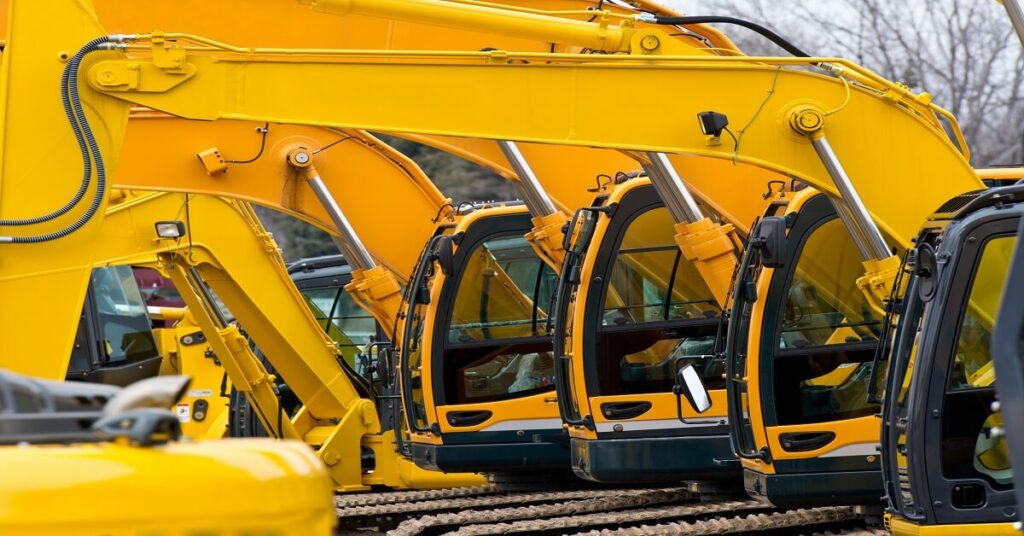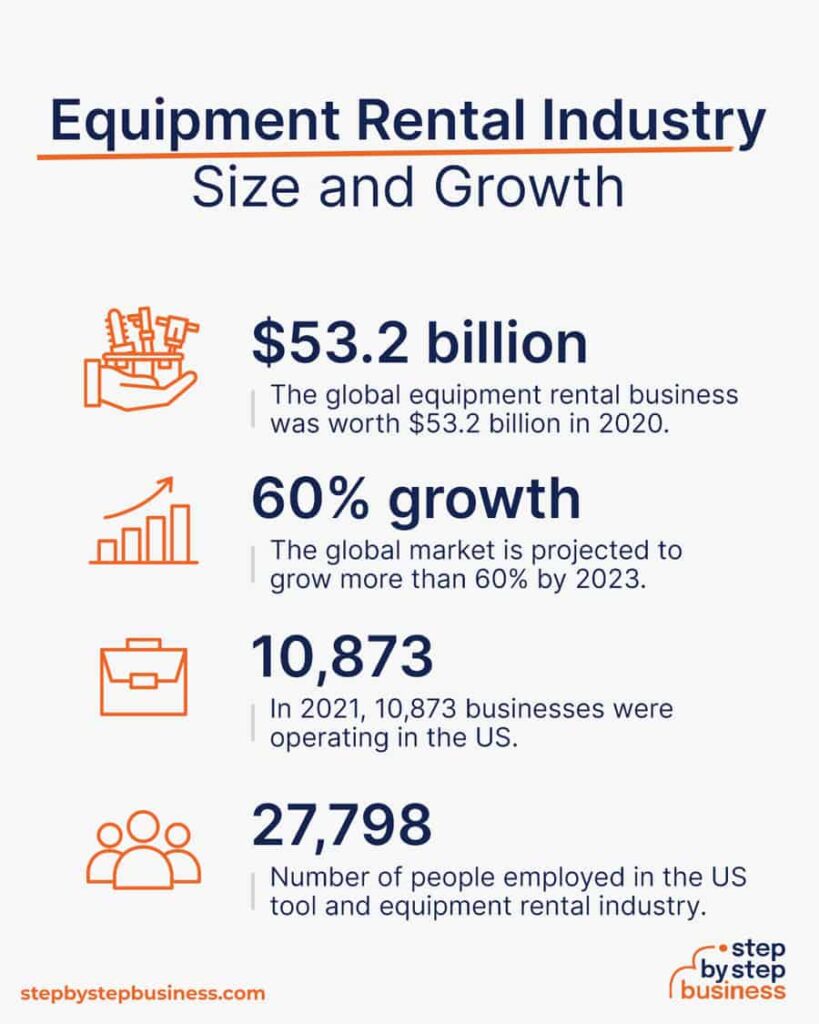Is Starting a Heavy Construction Equipment Rental Business Profitable?

The continual need for building projects and the money-saving advantages to contractors make it a good time to launch a heavy construction equipment leasing firm. This manual will explore the preparation, funding, and dangers of beginning such a venture. If you are a business owner interested in breaking into this field or an investor searching for a lucrative opportunity, you will find helpful information in this article.
Planning: Laying the Foundation
1. Market Research and Analysis

Source: stepbystepbusiness.com
It’s crucial to study the market carefully before investing in the heavy construction equipment rental industry. Gathering background data on the sector and its current state is an important first step. Here’s what you should do:
Local Construction Industry Assessment
Find out what the local building scene is like. Find out what construction projects are now underway and what are planned, as well as what typical construction equipment is employed. You may use this knowledge to choose the right tools.
Identify Target Audience
Find out who could become your customers. Do you want to reach sole proprietors in the construction industry or businesses in general? Consider their own requirements and tastes.
Competitor Analysis
Look into the local heavy equipment rental companies currently available. Analyze their advantages, disadvantages, and potential areas of competition so you can better position your own offerings. Consider the company’s internet presence, rental costs, equipment selection, and quality of customer service.
Rental Rates Comparison
Examine the rental fees of similar businesses to get a feel for the market average. Maintaining a profitable pricing structure is essential. Renting on a daily, weekly, or monthly basis might help you attract a wider variety of customers.
Customer Service Evaluation
Learn from the customer care practices of your rivals. Figure out where the market is lacking, then fill it by offering your product or service.
Equipment Offerings
Keep in mind the popular pieces of machinery. Depending on your resources and the state of the market, you may choose to invest in a wide variety of construction equipment, including excavators, bulldozers, cranes, and loaders.
2. Business Plan
Your heavy construction equipment rental company can’t succeed without a solid business strategy. Your financial and business objectives, as well as your anticipated earnings, are laid out in detail.
Business Goals
Think about both the near and far future and write them down. Where do you want to be in terms of growth rate, stability, or market share by a given date?
Target Market
Speculate about who your perfect client is. The industries you want to service and their unique demands for heavy equipment leasing should be highlighted.
Marketing Strategies
Lay out your plan for reaching out to the people you want to hear from. Online promotion, trade-show appearances, construction-industry networking, and joint venture formation are all viable options.
Financial Projections
Create conservative budget predictions for the next years. Think about things like projected earnings, running costs, the price of new equipment, and the profit margin. When looking for funding or investors, this area is crucial.
Risk Assessment
Think of things like economic downturns, problems in equipment, and new regulations that might affect your company. Plan for the possibility of these things happening.
3. Legal and Regulatory Considerations
When starting a heavy construction equipment rental company, it’s important to follow all applicable laws and regulations. What you need to think about is as follows:
Business Registration
Select the best legal framework for your business (sole proprietorship, limited liability company, or corporation) and file the necessary paperwork.
Permits and Licenses
Acquire all required authorizations and licenses. Local licenses, tax registrations, and specialized licenses may be required.
Safety Regulations
Adhere to regulations enacted by responsible bodies. The safety of your employees and customers must always come first while operating heavy machinery.
Environmental Compliance
Keep in mind that heavy machinery use is subject to restrictions on emissions, waste, and noise levels.
Insurance Coverage
Invest in comprehensive company insurance that includes protection against lawsuits and reimbursement for injured employees. Your company may avoid financial loss due to accidents and lawsuits if you invest in insurance.
Building a strong foundation for your heavy construction equipment rental company requires extensive market research, the creation of a complete business strategy, and adherence to all applicable laws and regulations. The groundwork laid here will pave the way for a successful launch and sustained expansion.
Investment: Putting Your Money to Work
1. Equipment Acquisition
You can’t start a construction company without first purchasing a large number of heavy machines. Here’s how to choose the right tools for the job:
New vs. Used Equipment
Weigh the benefits of buying new vs. secondhand before making a final decision. Used equipment is more cost-effective, but buying new comes with warranties and the newest technologies. Find the sweet spot between available resources and consumer demand.
Types of Machinery
Determine the building demands in the area and choose tools and equipment accordingly. Excavators, backhoe loaders, bulldozers, and cranes are all examples of common construction equipment. Having a more varied fleet allows you to take on more types of work.
Partnerships
Make contact with relevant manufacturers and equipment distributors. Developing a rapport with a company might get you better prices, early access to new models, or other perks.
Leasing Options
If you don’t have the cash on hand to buy the equipment outright, you may want to look into leasing instead. Leasing allows you to stretch the expense of expensive equipment acquisition over a longer period of time.
2. Operational Costs
The costs of maintaining a rental fleet of heavy machinery may add up quickly over time. Profitability depends on careful management of these expenses:
Equipment Maintenance
Set aside some money each month for upkeep and repairs. To keep customers happy and earn as much money as possible, it’s important to keep the fleet in top shape at all times.
Storage Facilities
Find a safe place to keep your gear out of the elements and out of sight. Consider the price of renting or buying, as well as any necessary safety precautions.
Insurance Coverage
Get full coverage insurance for all of your company’s equipment and vehicles. To prepare for the worst, businesses should invest in insurance policies such as general liability, equipment, and worker’s compensation.
Staffing
Invest in a team of expert technicians and operators to care for and run your heavy machinery. Staff with the proper training can fix any problems with the machinery and keep things running safely at all times.
3. Marketing and Branding
In order to succeed in business, it is essential to invest in marketing and branding.
Professional Website
Produce an accessible, detailed website that details your company’s equipment, services, and contact details. Customers may research your business and get in contact with you with more ease when using an online hub.
Online Advertising
Advertise online, but make sure it’s targeted. Advertising on Google and other social media platforms may help you connect with your ideal customers and increase website visits.
Industry Trade Shows
Take part in business conventions and exhibits. Participating in these gatherings allows you to display your wares, network with prospective customers, and stay abreast of developments in your field.
Networking
Connect with other professionals in the construction sector, including contractors and businesses. Increasing your company’s success via networking with other professionals.
Customer Relationships
Provide outstanding customer service in order to establish lasting bonds with your clientele. Customers who have their needs met are more inclined to use your services again and to promote them to others.
Positioning your heavy construction equipment rental firm for success requires smart investments in equipment acquisition, cost management, and innovative marketing methods. Thinking these things out and acting strategically can set you up for success and help you expand within your field.
Risk: Navigating the Challenges
1. Market Fluctuations
There are times of strong demand in the building sector, followed by periods of decreasing demand. These tactics will help you keep your heavy construction equipment rental company afloat through all the ups and downs:
Diverse Client Base
Don’t put all your eggs in the basket of just a few really important customers. You may lessen the blow of market downturns by diversifying your customer base. Having a diverse clientele of construction companies, businesses, and contractors may assist in ensuring a steady flow of income.
Financial Cushion
Create a buffer zone in your budget. Put away some of your boom-time earnings for use during the lean times. With this safety net in place, businesses may continue to function normally.
Flexible Rental Plans
Include a range of rental periods and pricing options to accommodate a variety of projects. This strategy might bring in customers during quiet times who are looking for temporary equipment.
2. Equipment Damage and Maintenance
Exposure to the elements causes heavy machinery to gradually deteriorate. It is crucial to effectively manage risks associated with equipment damage and maintenance.
Budget for Maintenance
Prepare a budget for regular maintenance and checks. Preventative maintenance extends the useful life of machinery and reduces the likelihood of malfunctions.
Emergency Repairs Fund
Make sure you have money set out for any unforeseen maintenance. A lack of readily accessible resources for repairs may delay projects and damage your reputation.
Maintenance Services
As a means of bringing in extra cash, you may try providing maintenance services to your clientele. One way to stand out from the competition is to provide maintenance services for the rental equipment they use.
3. Competition and Pricing Pressure
Offering low pricing and setting yourself apart from the competition are both crucial in the equipment rental industry.
Competitive Pricing
Find out what other rental businesses in the area are charging, and then determine prices that will allow you to stay in business. Finding that sweet spot guarantees you’ll bring new customers without reducing your bottom line.
Quality Assurance
Prioritize trustworthy and high-quality machinery. Client satisfaction is increased when well-maintained, up-to-date machinery is used on their project.
Customer Service
Providing exceptional service to customers may set a business apart. You may set yourself apart from the competition by responding quickly, communicating openly, and solving customer problems.
Value-Added Services
Provide value-added services such as delivery, training, and maintenance for the equipment you sell. In exchange for the value they offer, customers are willing to pay a premium for these services.
Continuous Improvement
Keep abreast of what’s happening in your field and in technology. Adopt cutting-edge practices to boost productivity, save expenses, and maintain a competitive edge.
Risk management in the heavy construction equipment rental industry calls for forethought, adaptability, and a relentless pursuit of excellence. You will be well-equipped to succeed in a competitive atmosphere if you plan for market swings, efficiently manage equipment maintenance, and set yourself apart via quality and customer service. Keep in mind that difficulties are only disguised opportunities, and that the survival and growth of your company depend on your capacity for adaptation and innovation.
Final Wrap-Up
Making the Most of It Starting a heavy construction equipment leasing company may be lucrative with the right preparation, investments, and risk management strategies. Keep in mind that success won’t come instantly when you begin your path. It calls for hard work, flexibility, and the will to always provide your customers with the best products and services possible. Building a successful company that helps the construction industry expand while reaping financial gains is possible by following the advice in this article and keeping up with industry developments.
Keep in mind that despite the dangers of the road, the construction industry’s ongoing need for heavy machinery presents a potential long-term opportunity for business owners. You can make a successful long-term company out of renting heavy construction equipment if you adopt the proper mentality and approach.
